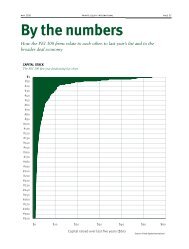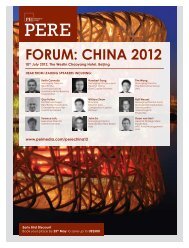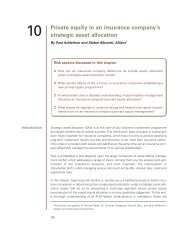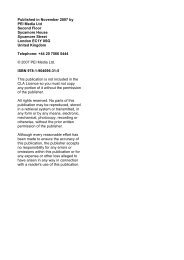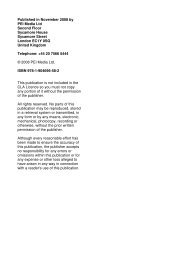Marathon of Marathons 2010 - PEI Media
Marathon of Marathons 2010 - PEI Media
Marathon of Marathons 2010 - PEI Media
You also want an ePaper? Increase the reach of your titles
YUMPU automatically turns print PDFs into web optimized ePapers that Google loves.
The pre-race luncheon<br />
In the footsteps <strong>of</strong> Pheidippides | Athens, 31 October <strong>2010</strong> 20<br />
Dr David Bellingham, Sotheby’s Institute <strong>of</strong> Art<br />
The battle <strong>of</strong><br />
marathon<br />
“The village <strong>of</strong> <strong>Marathon</strong>, being a<br />
marathon in distance from the urban sprawl<br />
<strong>of</strong> Athens, has changed very little over the last<br />
2,500 years, and in Lord Byron’s timeless words,<br />
“preserves alike its bounds and boundless<br />
fame”. In the Romantic years <strong>of</strong> the early<br />
nineteenth century, after Lord Elgin had sent the<br />
Parthenon marbles to Britain, Byron continued:<br />
“<strong>Marathon</strong> became a magic word;/Which<br />
utter’d to the hearer’s eye appear/The camp,<br />
the host, the fight, the conqueror’s career,/The<br />
flying Mede, his shaftless broken bow;/The fiery<br />
Greek, his red pursuing spear....”.<br />
To the runners <strong>of</strong> the <strong>2010</strong> <strong>Marathon</strong>,<br />
this “magic word” once more evoked the<br />
topography, atmosphere and struggles <strong>of</strong><br />
the famous battle. The route <strong>of</strong> the race<br />
deliberately veered <strong>of</strong>f the straight main road to<br />
Athens, in order to circumnavigate the funerary<br />
mound. Several runners were equipped with<br />
helmet, sword and sandals in memory <strong>of</strong> the<br />
192 young Athenian soldiers whose ashes lie<br />
beneath the mound which marks the epicentre<br />
<strong>of</strong> the battle. Pr<strong>of</strong>essor John Boardman has<br />
counted precisely 192 men on the Parthenon<br />
frieze (there are less today, but some <strong>of</strong> the<br />
slabs are missing), and argues that the famous<br />
cavalcade commemorates the <strong>Marathon</strong> dead<br />
Dr David Bellingham<br />
by elevating the majority from infantrymen to<br />
equestrians, with magnificent pectorals and iliac<br />
crests thrown in for good measure.<br />
What do we know about the battle <strong>of</strong><br />
<strong>Marathon</strong>? It was fought between the (mainly<br />
Athenian) Greeks and Persians in the summer<br />
or autumn <strong>of</strong> 490 BCE. No one knows the<br />
exact month or day, although sources tell us<br />
<strong>of</strong> a full moon, and therefore it could have<br />
been on September 11th, a highly significant<br />
day, considering that <strong>Marathon</strong> decided the<br />
future fate <strong>of</strong> the Eastern and Western empires!<br />
Ancient historians - all Greek, and therefore the<br />
numbers are probably exaggerated - tell us that<br />
the Persians (Byron’s “Medes”) far outnumbered<br />
the Athenians, but that the Athenians induced<br />
a panic into the Persian ranks by a surprisingly<br />
Dr David Bellinghaminto marshland, and over<br />
6,000 died before they could reach the safety <strong>of</strong><br />
their ships.<br />
However, the Persians were not yet beaten.<br />
A second fleet was to the west <strong>of</strong> Athens, ready<br />
to attack the city in a classic pincer movement.<br />
Therefore, the surviving Athenians had to<br />
race back to Athens within the day in order to<br />
defend their wives and children.<br />
According to Peter Krentz’s recent<br />
scholarship, this is the real miracle <strong>of</strong> <strong>Marathon</strong>:<br />
namely that soldiers, already wearied by the<br />
battle, were able to cover the 26 miles back<br />
to Athens handicapped with 50-70 pounds<br />
<strong>of</strong> armour. Whether the legendary runner<br />
Pheidippides arrived before them to announce<br />
the victory and fall dead with exhaustion<br />
remains a moot point – his feat is not mentioned<br />
until several hundred years later. But the new<br />
theory means that our commemoration <strong>of</strong> the<br />
event is all the more remarkable and moving.<br />
Few <strong>of</strong> us would be willing or able to run a<br />
<strong>Marathon</strong> in nearly half a bodyweight <strong>of</strong> armour<br />
- but we might if it were a matter <strong>of</strong> the life and<br />
death <strong>of</strong> family and friends!”<br />
Following his inspirational talk to the team,<br />
David ran his first <strong>Marathon</strong> in just under five<br />
hours.<br />
Alternative<br />
Insight






